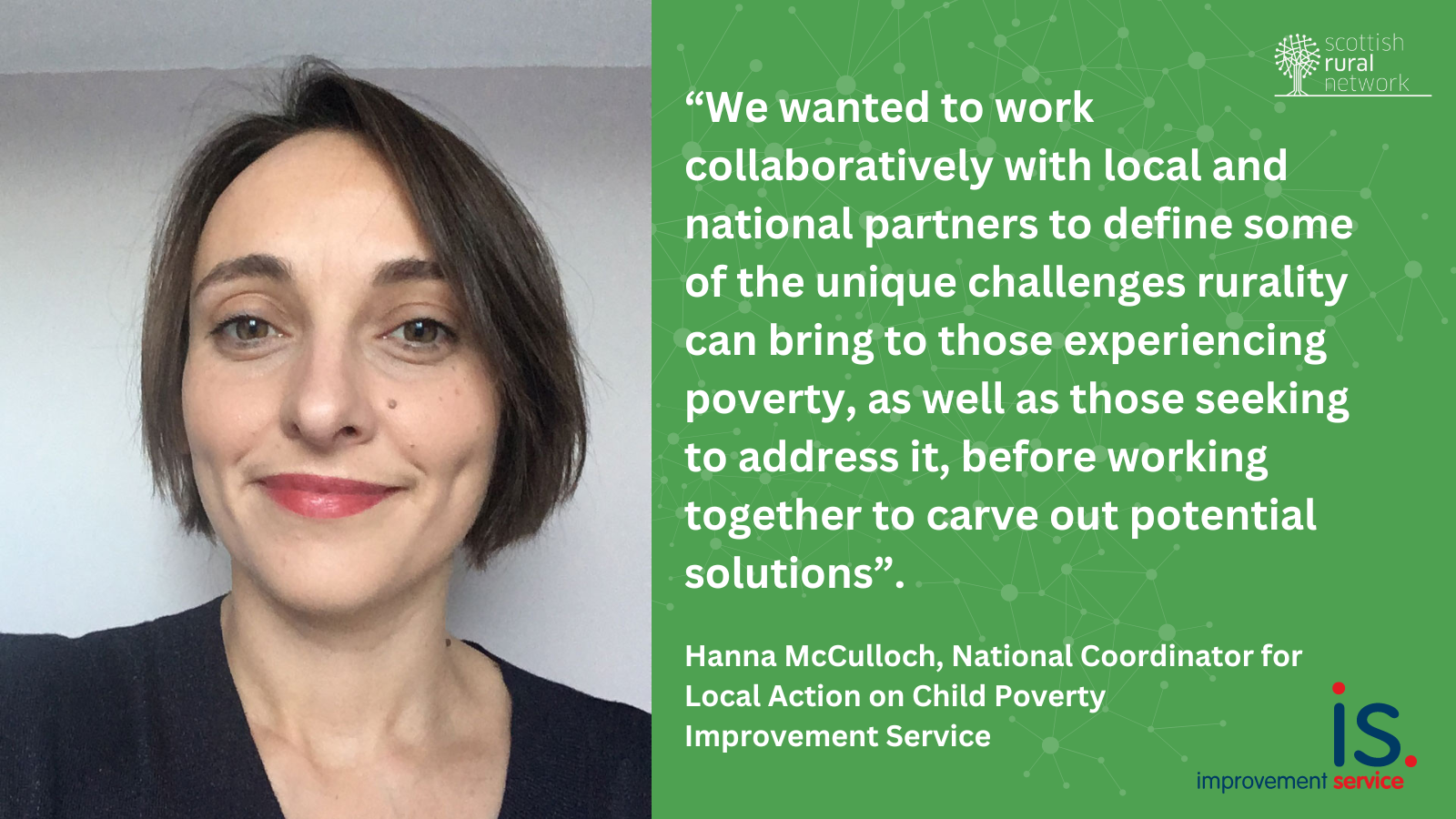Addressing the challenges of child poverty in remote and rural areas of Scotland

Is child poverty experienced differently in remote and rural areas? Do we need different solutions to understand and address it effectively? What are the barriers to doing that well?
These were some of the questions the Improvement Service and its local partners wanted to answer when embarking on an ambitious project looking at remote, rural and island child poverty, funded by the Scottish Rural Network.
We wanted to work collaboratively with local and national partners to define some of the unique challenges rurality can bring to those experiencing poverty, as well as those seeking to address it, before working together to carve out potential solutions.
The Scottish Approach to Service Design provided a route through some of the complexity and enabled us to capture the key issues with increased precision. Through the discovery phase - four online, multi-disciplinary sessions - we defined the main challenges experienced by those working to address poverty in rural contexts. The findings of that process are available in this report.
Subsequent meetings and online surveys, as well as the establishment of an online Remote, Rural and Island Child Poverty Network, then allowed us to work together to define the problems more clearly and start designing some of the solutions. You can view recordings of network meetings and other relevant materials here.
Some of the key issues identified through the process and the work underway to address them can be described as follows:
The difficulty of measuring poverty in remote, rural and island settings
The problem: The accuracy of the measures commonly used to understand poverty and inequality (such as the Scottish Index of Multiple Deprivation and the headline measures of child poverty) can be undermined by the dispersed nature of rural populations. This can make it difficult both to understand the scale and depth of rural poverty and secure the resources needed to respond proportionately.
Work towards a solution: The Remote, Rural and Child Poverty Network facilitated existing practice to be replicated and in some cases improved. Working together, local areas have developed increasingly sophisticated ways of layering local and national data together to help pinpoint areas of need. This has enabled councils to have better knowledge of who and where families experiencing poverty or at risk of experiencing poverty are, and the provision of appropriate support for them. You can watch videos of the work developed here.
The elevated cost of living in remote and rural settings
The problem: Not only is the cost of living significantly higher in remote, rural and island authorities but that reality is also masked by poverty statistics, which focus more on income than on outgoings.
Working towards a solution: As well as providing a forum for engaging with academics and civil servants around how we understand the cost of living, the Remote, Rural and Island Child Poverty Network has enabled one local authority to secure funding to access additional datasets which will enrich their understanding of how the cost of living varies across and within rural authorities. This should lead to enriched understanding for all.
The difficulty of sharing what we know about low income families
The problem: While local authorities and their partners might know of families who are struggling financially, the complexity of data sharing rules can make it hard to know when they can use that information to reach out with support.
Working towards a solution: Through the network, the IS brought in the expertise of SAVVI (Scalable Approach to Vulnerability Via Interoperability). This is an organisation of data governance experts - funded by the Department of Levelling Up, Housing and Communities which is now working with three Scottish local authorities, connected through the remote rural network, to provide them with clarity and confidence in relation to data governance and how they use the data they have to reach out to households most vulnerable to child poverty. The hope is that, if successful, this approach could be replicated across Scotland. You can read SAVVI’s blog on the process to date here.
We strongly believe in the value of this work and the importance of developing a shared understanding of the extent, scale and experience of child poverty in rural areas.
Having clearer mapping of where financially vulnerable families are, as well as understanding how to use data to target support to those families, will help boost incomes and hopefully lift families out of poverty. This in turn should help support families to stay in their local area and influence the development and sustainability of rural infrastructure which will mean that families won’t be forced to move to urban centres to access the support they need.
Sharing these resources and the learning generated from these SRN-funded projects will help to improve understanding of the particular issues associated with tackling rural and island child poverty, as well as sharing best practice so that systems and support can be put in place effectively.
This information will be of interest to:
- Local Child Poverty leads in Councils and Health Boards
- Local Action Group (LAG) members
- Scottish Government
- Organisations working on tackling child poverty
- Other national partners including Public Health Scotland, COSLA, other Improvement Service Programmes and those working in related public bodies with a duty to consider socio-economic disadvantage.
You can find the resources on the Improvement Service website which includes a video highlighting the work undertaken and shares some of learning from the projects.
For more information, or to join the Remote, Rural and Island Child Poverty Network please contact:
Hanna McCulloch, National Coordinator for Local Action on Child Poverty, Improvement Service
